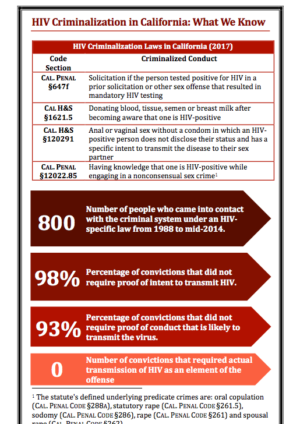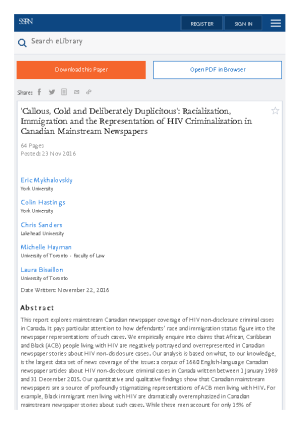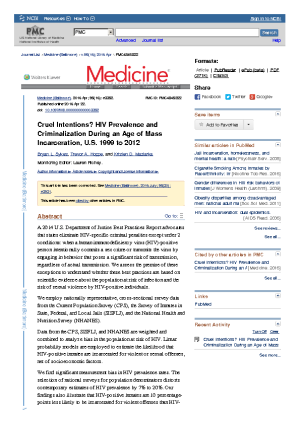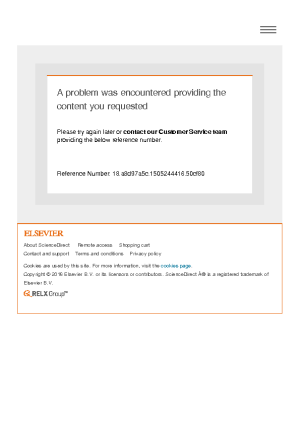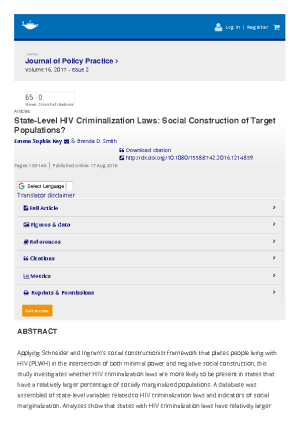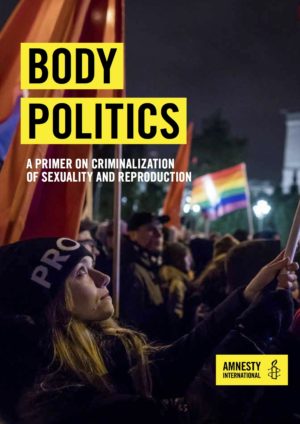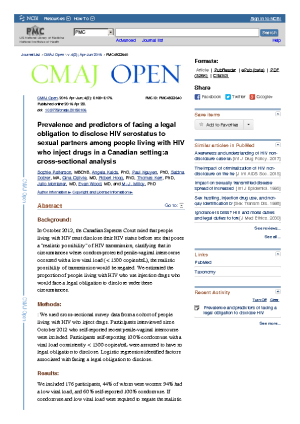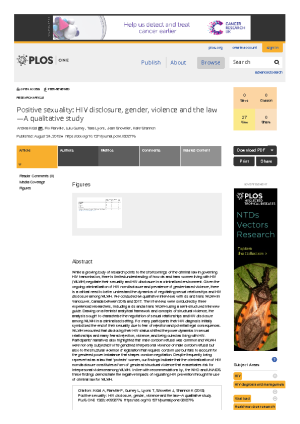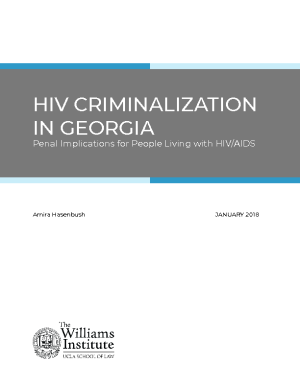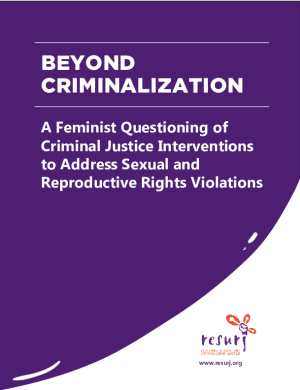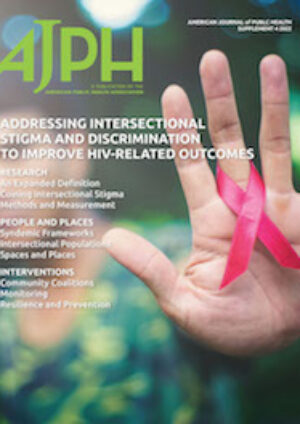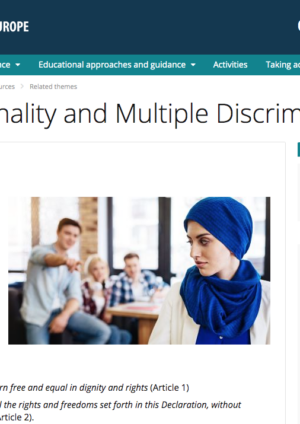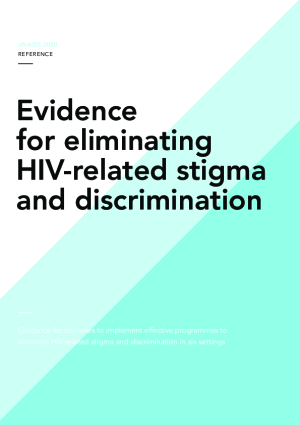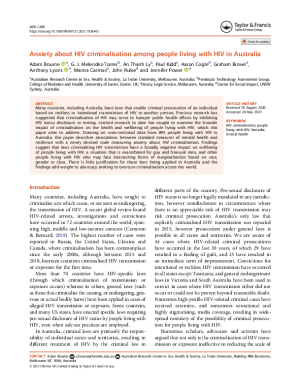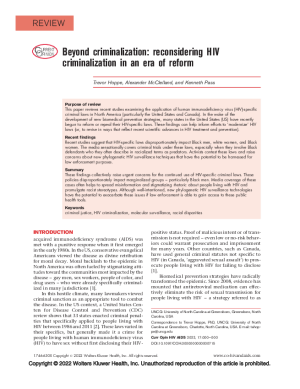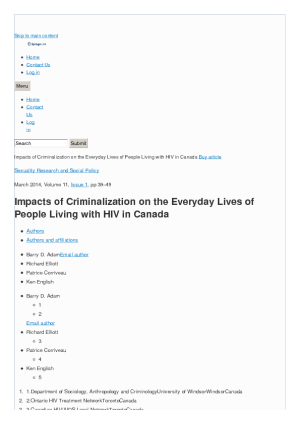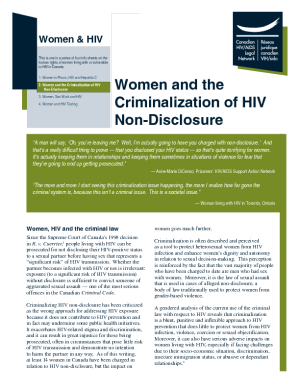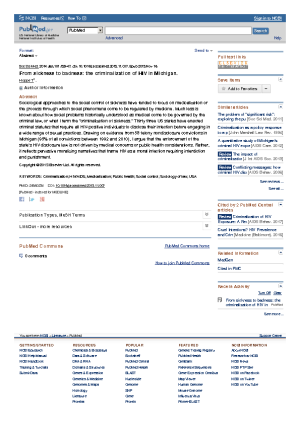Highlights significant findings about Californian criminal law including that more than 800 people have come in contact with California’s criminal system based on their HIV status, with 93% of convictions requiring no proof of conduct likely to transmit HIV. Also finds HIV criminal statutes are disparately enforced based on race/ethnicity, sexuality and gender.
Increases stigma and social disadvantage
Stigma and discrimination against people living with HIV is highly problematic, undermining quality of life for people with HIV and creating an environment in which people are less likely to disclose their HIV status. Equality before the law requires that all people should be treated equally regardless of race, gender, religion or other characteristics. The following reports have shown that HIV prosecutions are more likely to be used against specific populations, exacerbating social disadvantage.
HIV Criminalization in Canada: Key Trends and Patterns
Provides a snapshot of the temporal and demographic patterns of HIV criminalization in Canada from 1989 to 2020, also updating information on the outcomes of criminal cases. Finds people are often convicted in cases involving negligible or no risk of HIV transmission, and that criminal law is increasingly used against people living with HIV from marginalized populations.
‘Callous, Cold and Deliberately Duplicitous’: Racialization, Immigration and the Representation of HIV Criminalization in Canadian Mainstream Newspapers
Explores mainstream Canadian newspaper coverage of HIV non-disclosure criminal cases in Canada, finding those newspapers are a source of profoundly stigmatizing representations of African, Caribbean and Black men living with HIV.
Cruel Intentions? HIV Prevalence and Criminalization During an Age of Mass Incarceration, U.S. 1999 to 2012
Argues that HIV criminalization laws impute a host of assumptions about the HIV-positive community and their sexual partners, suggesting social scientists and legislators should reassess the evidence that purportedly undergirds characterizations of HIV-positive persons as dangerous liaisons with cruel intentions.
Awareness and understanding of HIV non-disclosure case law among people living with HIV who use illicit drugs in a Canadian setting
Findings from a survey of people with HIV who use illicit drugs found that most were not aware of the 2012 Supreme Court ruling, which may place them at risk of prosecution. Discussions about disclosure and the law were lacking in healthcare settings.
State-Level HIV Criminalization Laws: Social Construction of Target Populations?
Applying a social constructionist framework that places people living with HIV in the intersection of both minimal power and negative social construction, this study investigates whether HIV criminalization laws are more likely to be present in states that have a relatively larger percentage of socially marginalized populations, finding that that states with HIV criminalization laws have relatively larger African American populations.
Body Politics: A Primer on Criminalization of Sexuality and Reproduction
Details the major areas of concern and the harm which both direct and indirect criminalization inflict on an individual’s human rights and the health of society as a whole.
Prevalence and predictors of facing a legal obligation to disclose HIV serostatus to sexual partners among people living with HIV who inject drugs in a Canadian setting:a cross-sectional analysis
Observes that if both condom use and a low viral load are required to avoid criminal liability for HIV nondisclosure, many people living with HIV who inject drugs risk criminal prosecution if they do not disclose their HIV serostatus to sexual partners. Further, the article finds that Canadian law disproportionately impacts the most marginalized and vulnerable women living with HIV in Canada.
Positive sexuality: HIV disclosure, gender, violence and the law—A qualitative study
Drawing on a feminist analytical framework and concepts of structural violence, this analysis sought to characterize the negotiation of sexual relationships and HIV disclosure among Women Living with HIV (WLWH) in a criminalized setting. Researchers conducted 64 qualitative interviews with cis and trans WLWH in Vancouver, Canada between 2015 and 2017. Despite frequently being represented as a law that ‘protects’ women, the study findings indicate that the criminalization of HIV non-disclosure constitutes a form of gendered structural violence that exacerbates risk for interpersonal violence among WLWH. In line with recommendations by, the WHO and UNAIDS these findings demonstrate the negative impacts of regulating HIV prevention through the use of criminal law for WLWH.
Women and HIV criminalization
This policy brief represents the view, as women living with HIV, of the current state of criminalization of HIV among women in Canada and the United States after reviewing academic and grey literature, statutes and policies and an unpublished survey of membership. ICW-NA members highlighted their concern about stigma and discrimination in the justice system related to HIV non-disclosure.
HIV Criminalization in Georgia: Penal Implications for People Living with HIV/AIDS
Analyses how HIV criminalisation laws in Georgia have been utilised and assesses preliminary findings on disparities between sub-populations. Found that there might be disparities in enforcement of HIV Criminalisation laws related to geography, race/ethnicity, sex at birth or sex worker (or suspected sex worker) status.
Beyond Criminalization: A Feminist Questioning of Criminal Justice Interventions to Address Sexual and Reproductive Rights Violations
The report presents the findings of the desktop research lead by the global south feminist alliance RESURJ, (Realizing Sexual and Reproductive Justice), as part of the alliance’s leadership work on the shortcomings and limitations of penal policies in addressing sexual and reproductive rights violations. The aim of the review and this analytical report is to strengthen RESURJ’s evidence base on sexual and reproductive justice and to further engage with diverse feminists and groups to reimagine alternatives to criminalized approaches, alternatives that put human rights and justice at the center.
IAS 2021 Conference on HIV Science Symposium | HIV Is Not A Crime
The symposium panel, moderated by a campaign champion, explored the impact of HIV criminalisation on the most affected communities.
Punishing Vulnerability Through HIV Criminalization (2022)
This article explores the links between HIV criminalisation and other punitive laws and policies that regulate bodily autonomy, including reproduction, sexuality and gender.
Intersectionality and Multiple Discrimination
The concept of multiple discrimination recognises that discrimination can occur on the basis of more than one perceived characteristic. For example, a person who is discriminated on the grounds of their ethnicity may be also discrimination on the grounds of gender, sexual orientation, age, and so on. Such discrimination can, and often does, create cumulative disadvantage.
Evidence for eliminating HIV-related stigma and discrimination – Guidance for countries to implement effective programmes to eliminate HIV-related stigma and discrimination in six settings
This report reviews the latest evidence on what works to reduce HIV-related stigma and discrimination through key programmes to reduce stigma and discrimination and increase access to justice in the six settings of focus for the Global Partnership, including Justice. It includes guidance and recommendations for national governments and key stakeholders to implement programmes to empower populations “being left behind”; remove laws criminalising drug use or possession for personal use, all aspects of sex work, sexual orientation, gender identity, and HIV exposure, non-disclosure and transmission and to routinely review existing laws, regulations and policies relating to HIV.
- Alternative links
- Portuguese, French, Spanish, Russian
Anxiety about HIV criminalisation among people living with HIV in Australia
Drawing on cross-sectional data from 895 people living with HIV in Australia, this paper describes associations between standard measures of mental health and resilience with a newly devised scale measuring anxiety about HIV criminalisation. Findings suggest that laws criminalising HIV transmission have a broadly negative impact on wellbeing of people living with HIV, a situation that is exacerbated for gay and bisexual men, and other people living with HIV who may face intersecting forms of marginalisation based on race, gender or class.
Position paper of the AIDS-Hilfen Austria on §178 and §179 StGB: Against discrimination in court
Austria’s Aidshilfen protest against discrimination of people with HIV in court and demand “the destigmatization of HIV-positive people in criminal law”. The support organisations state that HIV infection should no longer be covered by the criminal liability of Paragraph 178f. As long as this remains the case, “the current state of medical research must be taken into account when a court makes a decision. This means that both safer sex and the consistent use of drug therapy must be considered grounds for exclusion from proceedings.”
- Alternative links
- Deutsch,
Beyond criminalization: reconsidering HIV criminalization in an era of reform
This paper reviews recent studies examining the application of HIV-specific criminal laws in North America (particularly the United States and Canada). In the wake of the development of new biomedical prevention strategies, many states in the United States (US) have recently begun to reform or repeal their HIV-specific laws. These findings can help inform efforts to ‘modernize’ HIV laws (or, to revise in ways that reflect recent scientific advances in HIV treatment and prevention).
Impact of Canadian human immunodeficiency virus non-disclosure case law on experiences of violence from sexual partners among women living with human immunodeficiency virus in Canada: Implications for sexual rights
Study measured the reported impact of HIV non-disclosure case law on violence from sexual partners among women living with human immunodeficiency virus in Canada. Findings bolster concerns that human immunodeficiency virus criminalisation is a structural driver of intimate partner violence, compromising sexual rights of women living with HIV. HIV non-disclosure case law intersects with other oppressions to regulate women’s sexual lives.
Impacts of criminalization on the everyday lives of people living with HIV in Canada
Based on interviews with people living with HIV, participants reported that HIV prosecutions had created a heightened sense of fear, vulnerability and stigma – “consequences that can run contrary to the ostensible objective of discouraging behaviour likely to transmit HIV.”
Women and the Criminalization of HIV Non-Disclosure
Outlines the history of HIV prosecutions against women in Canada and why criminalization is bad for women. Includes recommendations for reform.
Disparate risks of conviction under Michigan’s felony HIV disclosure law: An observational analysis of convictions and HIV diagnosis, 1992-2010
Found uneven application of HIV criminalization laws in the state of Michigan, with black men and white women having a comparatively greater risk of conviction than white men or black women. White women had the highest conviction rate of any group analysed, suggesting they may face a particular burden under these laws. Many of the white women convicted were especially disadvantaged by issues such as poor mental health, substance abuse and homelessness.
From Sickness to Badness: The Criminalization of HIV in Michigan
Found that to justify a conviction or more severe punishment, prosecutors and judges often argued that HIV infection was a death sentence; that HIV is a deadly weapon; and that HIV-positive people are homicidal threats – despite fewer than 7% of cases involving alleged infection. Medical evidence was rarely invoked in the adjudication of cases. The study concludes that enforcement of HIV disclosure laws reflects pervasive, moralising narratives.
